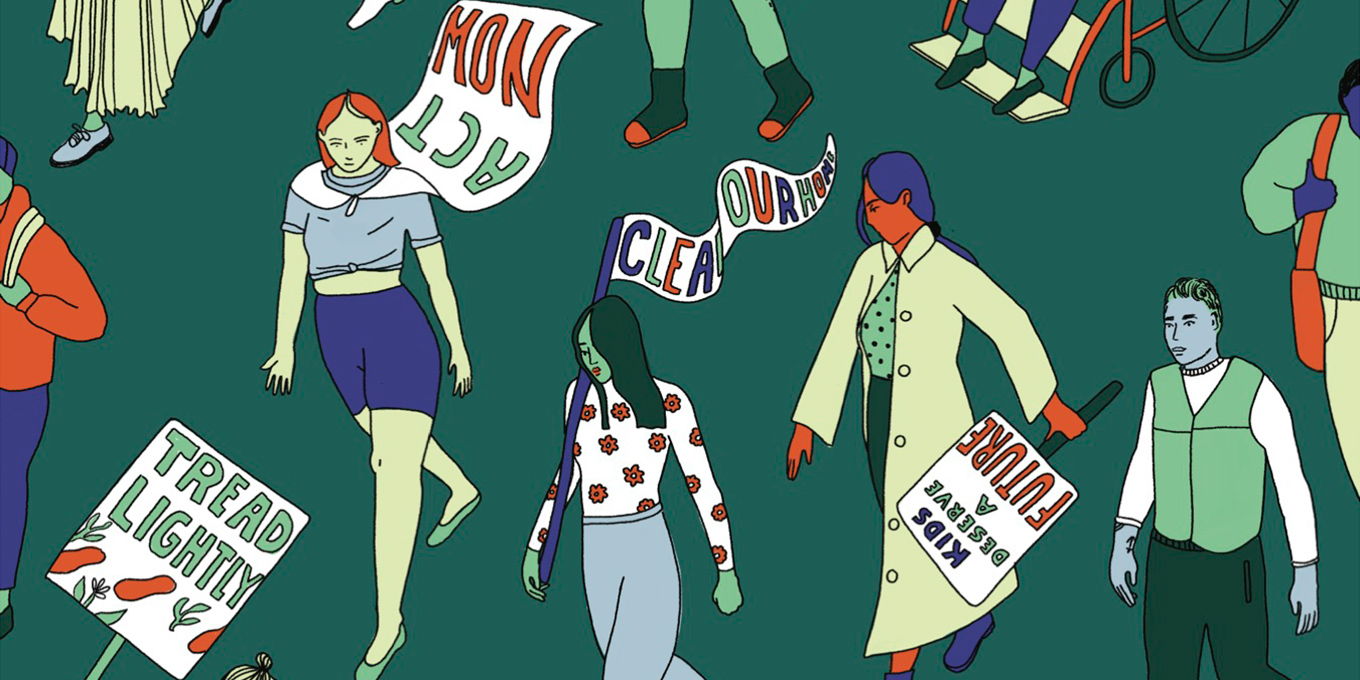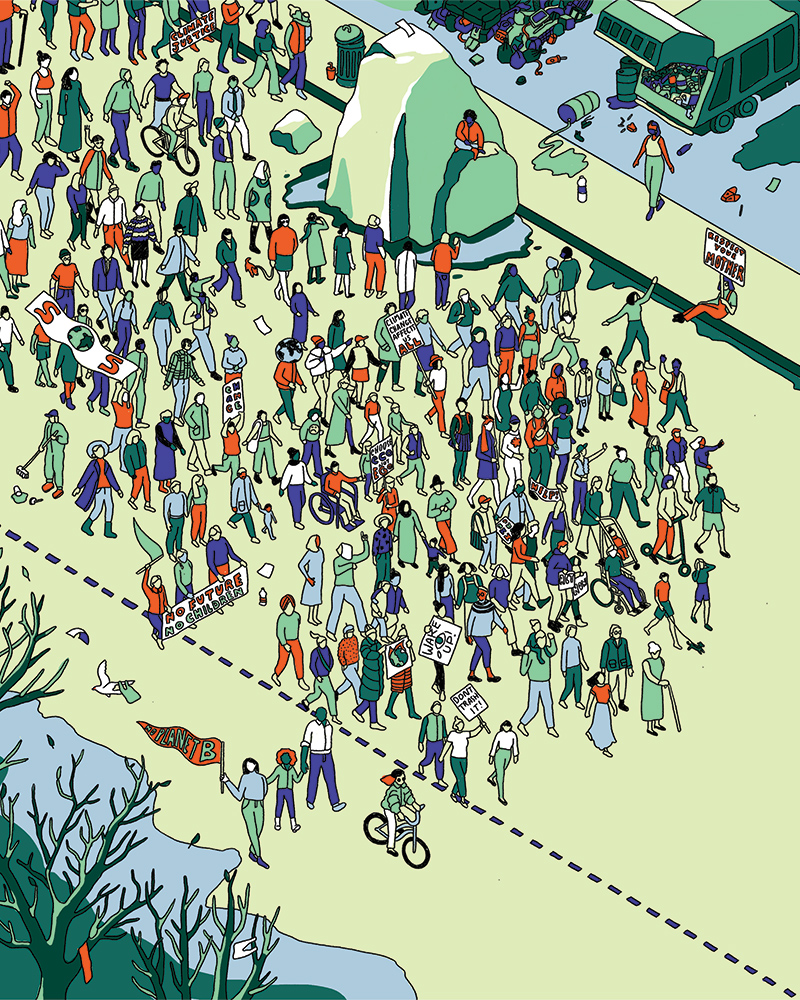Society
The Women Pledging Not to Have Kids Until Meaningful Action on Climate Change Is Made
Faced with an ever-worsening climate crisis, young women are taking matters – and their reproductive future – into their own hands.
by : Caitlin Stall-Paquet- Mar 9th, 2020

Madison Van Rijn
When I meet Emma Lin in a busy café next to McGill University, in downtown Montreal, there’s a lot on her mind – namely, mid-terms. The 19-year-old undergrad keeps apologizing as she pauses to refresh her email on her laptop, waiting for her grades to come in. As we talk, it’s hard to imagine this soft-spoken young woman being dragged out of the Ontario legislature by security. But she was – twice: once for protesting Premier Doug Ford’s decision to cancel the province’s cap-and-trade program, which aimed to limit corporate pollution, and another time for supporting MPP Peter Tabuns’ call for a new climate policy. Along with being temporarily banned from the premises, she also received written warnings from the Legislative Assembly of Ontario, which she hung on her bedroom wall like they were band posters. Lim’s mother – an oil and gas lawyer turned environmental lobbyist – urges her to be careful but also gave her a megaphone as a gift over the holidays.
While growing up in London, Ont., Lim worked as a nanny and imagined she would start a family herself one day, but after seeing report after report on the news about the impending climate crisis, she put that plan aside. She felt a growing sadness and fear that she was unable to shake, especially after spending hours reading the Intergovernmental Panel on Climate Change 2018 report, which outlines the need to limit global warming to well below 2°C. Upset, she talked with six friends in a Messenger group chat that quickly evolved into a full-blown movement. In 2019, Lim and her friends founded Climate Strike Canada, the organization that promoted countrywide school strikes (inspired by Greta Thunberg’s “Fridays for Future”) and was a driving force behind the September 27 climate strikes, the largest act of civil disobedience in Canadian history. And that same month, she also launched No Future No Children, the newest organization questioning reproduction in response to growing ecological distress and government inaction.
When I first found Lim on Instagram, I followed the link to her website, where an image of blazing flames serves as a fittingly disturbing background for the invitation: Sign here to pledge that you won’t have children until the government enacts policies to ensure a viable ecological future. She expected to get a few hundred clicks, but the count quickly climbed to over 5,000 and is still growing. I visited the site simply to peruse, but I was moved to sign up. Faced with devastating climate-related headlines that roll in like waves, washing over any optimism that my efforts to buy shampoo in bulk provide, I suddenly wanted to attach my name to a group that decries our inaction. Though some middle-aged people (who decided not to have children for environmental reasons years ago) have signed up for the pledge, I, at 32 years old, am still on the older side of the clickers.
“This movement isn’t actually about procreation; the women at its forefront are trying to humanize the stakes of climate issues by using their young, often privileged bodies.”
Many are Lim’s peers, who are part of a generation that she says is “characterized by this deep feeling of powerlessness.” While they are often portrayed as tech-addicted navel-gazers, gen Zers like Lim are actually, according to the American Psychological Association, anxiety-ridden, clear-eyed and likely to take action; they have, after all, come of age witness- ing the Parkland shootings and Thunberg’s steely determination. “Our generation grew up hearing about climate change, so it’s never something we doubted,” says Lim.
Some signatories are as young as 11, which is shocking – and that’s the point. This movement isn’t actually about procreation; the women at its forefront are trying to humanize the stakes of climate issues by using their young, often privileged bodies – the kind of bodies that might be more likely to get people talking in a world that finds it all too easy to ignore what the future could look like for the 143 million (mostly people of colour) living in sub-Saharan Africa, Latin America and South Asia who, it is estimated, will be displaced by 2050, according to a 2018 World Bank report.
Lim is not the only activist looking to capture the world’s attention with her womb. Chicago- based Josephine Ferorelli, who worked at Occupy.com, and Meghan Kallman, a sociology professor and city councillor in Pawtucket, R.I., started organizing house parties in 2014 under the moniker “Conceivable Future,” hoping to engender exchanges about the fear of birthing kids into an ecological catastrophe “because older adults have proven incapable of staving off tragedy,” says Kallman. It’s worth mentioning that more women seem to be involved in environmental action, perhaps partly because women and men experience climate change differently: Extreme weather events have a greater impact on the poor, and 70 percent of poor people globally are female, according to the International Union for Conservation of Nature. Of course, women aren’t the only ones protesting for the environment: The year before the Conceivable Future pair decided to join forces, male friends of Kallman’s used a lobster boat to block a freighter hauling 40,000 tonnes of coal into Massachusetts. The two men successfully impeded the ship for nearly eight hours, which was documented in striking photos of a hulking vessel dwarfing two roguish figures. The venture, says Kallman, relied on a “masculine hero narrative that made the whole thing work – like John Wayne at sea.” While there was nothing wrong with this action, Kallman wanted to stage her fight with a distinctly more intimate and female approach, because while procreation is obviously deeply private, creating life is inherently universal.
“Extreme weather events have a greater impact on the poor, and 70 percent of poor people globally are female.”
Conceivable Future was among the first of these groups to be founded, so it was also among the first to be misunderstood and mislabelled. Along with receiving generic hate mail, its members have been branded in the media as anti-natalists, which they’re not (although anti-natalists have sent them point-by-point plans for population reduction). The most common misconception, however, is that they want people to stop having children. In fact, they’re simply trying to make the climate crisis relevant to the generations who have so far turned a blind eye and provide solidarity for those who want to rebuild a world in which it makes sense to have kids. So Conceivable Future organizes events for people to “talk about feelings and turn them into meaningful collective action instead of sending people home to turn down the thermostat and buy a Tesla,” says Ferorelli. Members have testified before legislature and disrupted a governor’s speech about natural gas being a bridge fuel, for example. Kallman likes to draw a parallel between what Conceivable Future does and the first chapter of Betty Friedan’s The Feminine Mystique, called “The Problem That Has No Name.” She told me that “our place in the climate movement is helping name the problem and connect to what it means and why it matters. The next step is getting involved in a struggle, whether that’s a pipeline fight or running for office.”
As articles about restrictive abortion laws keep flooding our news feeds, groups like Conceivable Future are getting more attention than ever – but is their message truly being heard? Back in May, Lim met with Prime Minister Justin Trudeau at his Youth Summit and formally handed him a plea for action. He exclaimed that she was right to be concerned and then served her some well-prepared key messages about Canada taking climate action seriously, touting bans on single-use plastic while sidestepping the pipeline-shaped elephant in the room. In the end, she felt belittled and dismissed.
It often seems like these activists are shouting into the void, as their impassioned calls to action get brushed aside by people trying to uphold a business- as-usual model powered by fossil fuels. The same month Lim launched her initiative, for example, Blythe Pepino, a British musician in her early 30s, put her plans to start a family aside and founded England’s Birth Strike after leaning into the global Extinction Rebellion movement. When Pepino was interviewed on Fox News’ Tucker Carlson Tonight, which lost a lot of advertising support last year after Carlson made anti-immigrant remarks, the host served to illustrate a common reaction of older white men: He patronizingly told Pepino that she seemed like a nice person who should have kids because children solve a lot of problems. She shook her head, responding simply, “We don’t have time.” Carlson laughed, saying, “Yes, we do; there’s always time.”
 Madison Van Rijn
Madison Van Rijn There’s a gap in his math though. As Ferorelli puts it: “We’re working within a time frame of about 10 years to take the action that’s required, so it would be really unfortunate luck if all the solutions were contained in the mind of a child who has yet to gestate.” Though most parents probably have high hopes for their offspring, hoping that they will save the world before hitting puberty is too lofty a target even for the most ardent helicopter mom. So these groups hope that by renouncing reproduction, they can highlight that this is a crisis we need to conquer ourselves, in our own lifetime, instead of continuing to kick the single-use plastic bottle down the road.
The situation that’s unfolding is almost reminiscent of the Ancient Greek play Lysistrata, a comedy in which women withhold sex to end the Peloponnesian war, except that it packs plenty of saucy humour. And now, of course, the stakes are higher and there are no dick jokes. There’s no comedy at all, actually, since what’s being contested is an increasing global threat coming from all directions. The fact that kids are already making the decision not to have children is “a cry of terror,” says Pepino, and that panic is likely why it’s so difficult for older generations to listen. When we talk about birth striking and mass extinction, we’re also talking about death—something most Western societies are notoriously bad at processing.
“Rather than pointing fingers, we should be devoting our energy to figuring out how to enact the large-scale structural changes needed to prevent us from blowing past many more ecological tipping points.”
Kallman accepts that people in their 70s who are watching their children and grandchildren grapple with these questions also feel “tons of grief, guilt and fear, which is another endorsement for making more spaces to talk about this stuff instead of taking refuge in shaming, judging or platitudes.” Indeed, rather than pointing fingers, we should be devoting our energy to figuring out how to enact the large-scale structural changes needed to prevent us from blowing past many more ecological tipping points because time is desperately of the essence. Perhaps the women taking action feel the passing of time a little too acutely when faced with the reality of their reproductive future. The tick of the biological clock we were taught to fear has been drowned out by a much louder clock, and it gets louder and louder with every fraction of a degree we move closer to that 1.5°C warming limit – or, to adopt Lim’s stony-faced realism, a 2°C or even 4°C increase.
I want to hope that once the volume becomes unbearable, we’ll be forced into intergenerational conversation, using our indoor voices so as not to add to the noise. I want to think that if we put aside tired “okay, boomer” and entitled-millennial and -gen-Z tropes, we might be able to communicate and we might realize that we’re almost out of time before it’s truly too late. But right now, we’re just yelling at one another over the thunderous ticking – fighting about whether we should be bringing kids into a world of ever-rising temperatures and deaf ears.
This article originally appeared in the April 2020 issue of ELLE Canada. Subscribe here.
READ MORE:
Women Are Leading The Fight Against Climate Change
Clothes Are Being Made of Recycled Materials – But That Doesn’t Mean You Should Buy More
The World’s First Fair-Trade Plastic Is Now Available In Beauty Packaging
Newsletter
Join our mailing list for the latest and biggest in fashion trends, beauty, culture and celebrity.
Read Next

Fashion
This Canadian Swimwear Brand Designed Canada’s 2024 Women’s Olympic Beach Volleyball Team Uniforms
And they're *so* good.
by : Allie Turner- Apr 24th, 2024
Fashion
The Most Iconic Looks In Met Gala History, From 1973 To Now
40 years of the night that's all about trailblazing fashion.
by : ELLE Australia- Apr 24th, 2024

Beauty
Tested and Approved: Your New Hydrating Skincare BFF
This new product has all of your skin’s thirst-quenching needs covered.
by : ELLE Canada- Apr 17th, 2024




